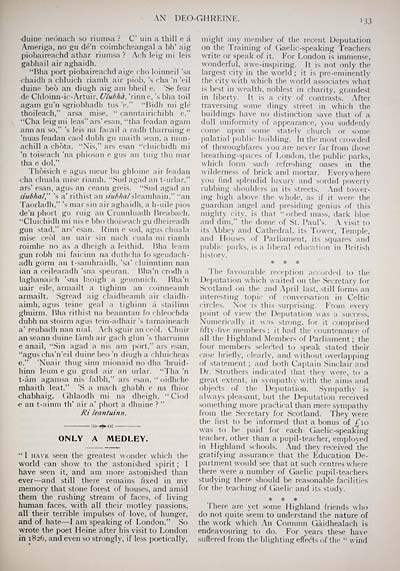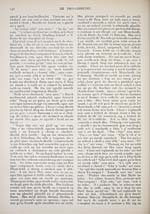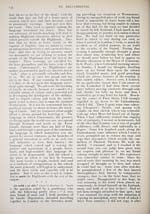Blair Collection > Deo-gréine
(157)
Download files
Complete book:
Individual page:
Thumbnail gallery: Grid view | List view

AN DEO-GHREINI
133
duine neonach so riumsa ? C uin a thill e à
Ameriga, no gu dè'n coimhcheangal a bh' aig
piobaireachd athar riumsa ? Ach leig mi leis
gabhail air aghaidh.
"Bha port piobaireachd aige cho loinneil 'sa
chaidh a chluich riamh air piob, 's cha 'n 'eil
duine beò an diugh aig am bheil e. 'Se fear
de Chloinn-ic-Artuir, Ulubhà, 'rinne, 's bha toil
again gu'n sgriobhadh tus V." "Bidh mi gle
thoileach," arsa mise, " canntairichibh e."
"Cha leig mi leas" ars' esan, "tha feadan agam
ann an so," 's leis na facail a radh tharruing e
'nuas feadan caol dubh gu maith sean, a mun-
achill a chòta. "Nis," ars esan "cluichidh mi
'n toiseach na phiosan e gus an tuig thu mar
tha e dol."
Thòisich e agus meur bu ghloine air feadan
cha chuala mise riamh. "Sud agad an t-urlar,"
ars' esan, agus an ceann greis. "Sud agad an
siubhal" 's a' rithist an ««Ma/sleamhain," '"an
Taorladh," 's mar sin air aghaidh, a h-uile pios
de'n phort gu ruig an Crunnluadh Breabach.
"Cluichidh mi nis e bho thoiseach gu dheireadh
gun stad," ars' esan. Rinn e sud, agus chuala
mise ceòl an uair sin nacli cuala mi riamh
roimhe no as a dheigh a leithid. Bha learn
gun robh mi faicinn na duthcha fosgeudach-
adh gorm an t-samhraidh, 'sa' cluinntinn nan
ian a ceilearadh 'sna speuran. Bha'n crodh a
laghanaich 'sna laoigh a geumnich. Bha'n
uair eile, armailt a tighinn an coinneamh
armailt. Sgread aig claidheamh air claidh-
aimh, agus teine geal a tighinn a stailinn
ghuirm. Bha rithist na beanntan fo chlenchda
dubh na stoirm agus tein-adhair 's tarnaineach
a' reubadh nan nial. Ach sguir an ceòl. Chuir
an seann duine làmh air gach glun 's tharruinn
e anail, "Sin agad a nis am port," ars esan,
"agus cha'n'eil duine beo 'n diugh a chluicheas
e." 'Nuair thug sinn mionaid no dha 'bruid-
hinn leum e gu grad air an urlar. "Tha 'n
t-àm agamsa nis falbh," ars esan, " oidhche
mhaith leat." 'S a mach ghabh e na fhior
chabhaig. Ghlaodh mi na dheigh, " Ciod
■e an t-ainm th' air a' phort a dhuine ? "
Ri leantuinn.
ONLY A MEDLEY.
" I have seen the greatest wonder which the
world can show to the astonished spirit ; I
have seen it, and am more astonished than
ever — and still there remains fixed in my
memory that stone forest of houses, and amid
them the rushing stream of faces, of living
human faces, with all their motley passions,
all their terrible impulses of love, of hunger,
and of hate — I am speaking of London." So
wrote the poet Heine after his visit to London
in 1826, and even so strongly, if less poetically,
might any member of the recent Deputation
on the Training of Gaelic-speaking Teachers
write or speak of it. For London is immense,
wonderful, awe-inspiring. It is not only the
largest city in the world ; it is pre-eminently
the city with which the world associates what
is best in wealth, noblest in charity, grandest
in liberty. It is a city of contrasts. After
traversing some dingy street in which the
buildings have no distinction save that of a
dull uniformity of appearance, you suddenly
come upon some stately church or some
palatial public building. In the most crowded
of thoroughfares you are never far from those
breathing-spaces of London, the public parks,
which form such refreshing oases in the
wilderness of brick and mortar. Everywhere
you find splendid luxury and sordid poverty
rubbing shoulders in its streets. And tower-
ing high above the whole, as if it were the
guardian angel and presiding genius of this
mighty city, is that "orbed mass, dark blue
and dim," the dome of St. Paul's. A visit to
its Abbey and Cathedral, its Tower, Temple,
and Houses of Parliament, its squares and
public parks, is a liberal education in British
history.
'I'lic favourable reception accorded to the
Deputation which waited on the Secretary for
Scotland 011 the 2nd April last, still forms an
interesting topic of conversation in Celtic
circles. Nor is this surprising. From every
point of view the Deputation was a success.
Numerically it was strong, for it comprised
fifty-five members; it had the countenance of
all the Highland Members of Parliament ; the
four members selected to speak stated their
case briefly, clearly, and without overlapping
of statement ; and both Captain Sinclair and
Dr. Struthers indicated that they were, to a
great extent, in sympathy with the aims and
objects of the Deputation. Sympathy is
always pleasant, but the Deputation received
something more practical than mere sympathy
from the Secretary for Scotland. They were
the first to be informed that a bonus of £10
was to be paid for each Gaelic-speaking
teacher, other than a pupil-teacher, employed
in Highland schools. And they received "the
gratifying assurance that the Education De-
partment would see that at such centres where
there were a number of Gaelic pupil-teachers
studying there should be reasonable, facilities
for the teaching of Gaelic and its study.
* * *
There are yet some Highland friends who
do not quite seem to understand the nature of
the work which An Comunn Gàidhealach is
endeavouring to do. For years these have
suffered from the blighting effects of the " wind
133
duine neonach so riumsa ? C uin a thill e à
Ameriga, no gu dè'n coimhcheangal a bh' aig
piobaireachd athar riumsa ? Ach leig mi leis
gabhail air aghaidh.
"Bha port piobaireachd aige cho loinneil 'sa
chaidh a chluich riamh air piob, 's cha 'n 'eil
duine beò an diugh aig am bheil e. 'Se fear
de Chloinn-ic-Artuir, Ulubhà, 'rinne, 's bha toil
again gu'n sgriobhadh tus V." "Bidh mi gle
thoileach," arsa mise, " canntairichibh e."
"Cha leig mi leas" ars' esan, "tha feadan agam
ann an so," 's leis na facail a radh tharruing e
'nuas feadan caol dubh gu maith sean, a mun-
achill a chòta. "Nis," ars esan "cluichidh mi
'n toiseach na phiosan e gus an tuig thu mar
tha e dol."
Thòisich e agus meur bu ghloine air feadan
cha chuala mise riamh. "Sud agad an t-urlar,"
ars' esan, agus an ceann greis. "Sud agad an
siubhal" 's a' rithist an ««Ma/sleamhain," '"an
Taorladh," 's mar sin air aghaidh, a h-uile pios
de'n phort gu ruig an Crunnluadh Breabach.
"Cluichidh mi nis e bho thoiseach gu dheireadh
gun stad," ars' esan. Rinn e sud, agus chuala
mise ceòl an uair sin nacli cuala mi riamh
roimhe no as a dheigh a leithid. Bha learn
gun robh mi faicinn na duthcha fosgeudach-
adh gorm an t-samhraidh, 'sa' cluinntinn nan
ian a ceilearadh 'sna speuran. Bha'n crodh a
laghanaich 'sna laoigh a geumnich. Bha'n
uair eile, armailt a tighinn an coinneamh
armailt. Sgread aig claidheamh air claidh-
aimh, agus teine geal a tighinn a stailinn
ghuirm. Bha rithist na beanntan fo chlenchda
dubh na stoirm agus tein-adhair 's tarnaineach
a' reubadh nan nial. Ach sguir an ceòl. Chuir
an seann duine làmh air gach glun 's tharruinn
e anail, "Sin agad a nis am port," ars esan,
"agus cha'n'eil duine beo 'n diugh a chluicheas
e." 'Nuair thug sinn mionaid no dha 'bruid-
hinn leum e gu grad air an urlar. "Tha 'n
t-àm agamsa nis falbh," ars esan, " oidhche
mhaith leat." 'S a mach ghabh e na fhior
chabhaig. Ghlaodh mi na dheigh, " Ciod
■e an t-ainm th' air a' phort a dhuine ? "
Ri leantuinn.
ONLY A MEDLEY.
" I have seen the greatest wonder which the
world can show to the astonished spirit ; I
have seen it, and am more astonished than
ever — and still there remains fixed in my
memory that stone forest of houses, and amid
them the rushing stream of faces, of living
human faces, with all their motley passions,
all their terrible impulses of love, of hunger,
and of hate — I am speaking of London." So
wrote the poet Heine after his visit to London
in 1826, and even so strongly, if less poetically,
might any member of the recent Deputation
on the Training of Gaelic-speaking Teachers
write or speak of it. For London is immense,
wonderful, awe-inspiring. It is not only the
largest city in the world ; it is pre-eminently
the city with which the world associates what
is best in wealth, noblest in charity, grandest
in liberty. It is a city of contrasts. After
traversing some dingy street in which the
buildings have no distinction save that of a
dull uniformity of appearance, you suddenly
come upon some stately church or some
palatial public building. In the most crowded
of thoroughfares you are never far from those
breathing-spaces of London, the public parks,
which form such refreshing oases in the
wilderness of brick and mortar. Everywhere
you find splendid luxury and sordid poverty
rubbing shoulders in its streets. And tower-
ing high above the whole, as if it were the
guardian angel and presiding genius of this
mighty city, is that "orbed mass, dark blue
and dim," the dome of St. Paul's. A visit to
its Abbey and Cathedral, its Tower, Temple,
and Houses of Parliament, its squares and
public parks, is a liberal education in British
history.
'I'lic favourable reception accorded to the
Deputation which waited on the Secretary for
Scotland 011 the 2nd April last, still forms an
interesting topic of conversation in Celtic
circles. Nor is this surprising. From every
point of view the Deputation was a success.
Numerically it was strong, for it comprised
fifty-five members; it had the countenance of
all the Highland Members of Parliament ; the
four members selected to speak stated their
case briefly, clearly, and without overlapping
of statement ; and both Captain Sinclair and
Dr. Struthers indicated that they were, to a
great extent, in sympathy with the aims and
objects of the Deputation. Sympathy is
always pleasant, but the Deputation received
something more practical than mere sympathy
from the Secretary for Scotland. They were
the first to be informed that a bonus of £10
was to be paid for each Gaelic-speaking
teacher, other than a pupil-teacher, employed
in Highland schools. And they received "the
gratifying assurance that the Education De-
partment would see that at such centres where
there were a number of Gaelic pupil-teachers
studying there should be reasonable, facilities
for the teaching of Gaelic and its study.
* * *
There are yet some Highland friends who
do not quite seem to understand the nature of
the work which An Comunn Gàidhealach is
endeavouring to do. For years these have
suffered from the blighting effects of the " wind
Set display mode to: Large image | Transcription
Images and transcriptions on this page, including medium image downloads, may be used under the Creative Commons Attribution 4.0 International Licence unless otherwise stated. ![]()
| Early Gaelic Book Collections > Blair Collection > Deo-gréine > (157) |
|---|
| Permanent URL | https://digital.nls.uk/76699420 |
|---|
| Description | A selection of books from a collection of more than 500 titles, mostly on religious and literary topics. Also includes some material dealing with other Celtic languages and societies. Collection created towards the end of the 19th century by Lady Evelyn Stewart Murray. |
|---|
| Description | Selected items from five 'Special and Named Printed Collections'. Includes books in Gaelic and other Celtic languages, works about the Gaels, their languages, literature, culture and history. |
|---|

